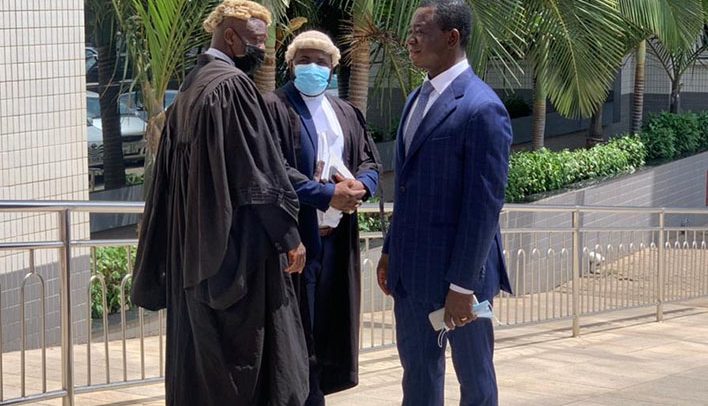Dr. Stephen Opuni with his lawyers
The Attorney General, Godfred Yeboah Dame, yesterday urged the Supreme Court to reverse what he described as ‘fundamentally flawed decision’ which removed Justice Clemence Honyenuga, a Supreme Court judge sitting as an additional High Court judge, from the trial of former Chief Executive Officer of Ghana Cocoa Board (COCOBOD), Dr. Stephen Opuni.
Main Trial
Dr. Opuni, together with businessman Seidu Agongo and the businessman’s Agricult Ghana Limited are standing trial on 27 charges of causing financial loss to the state, defrauding by false pretences, conspiracy to commit crime, abetment of crime, money laundering, corruption by public officer and contravention of the PPA Act in their dealings with COCOBOD between 2013 and 2016.
Together, they are accused of causing a financial loss of over GH¢217 million to the state through the sale and purchase of the controversial Lithovit Liquid Fertiliser, which the prosecution says was never tested.
Restraining Order
Five Supreme Court judges before the 2021 legal vacation, in a 3-2 majority, ruled that their colleague Justice Honyenuga cannot continue to hear the case on stated grounds of bias as complained by Dr. Opuni.
The panel, chaired by Justice Jones Victor Dotse, then granted an application by Dr. Opuni which sought a certiorari to quash portions of Justice Honyenuga’s ruling on a submission of no case as well as prohibit him from further hearing the case.
The majority made up of Justices Gabriel Pwamang, Agnes Dordzie and Umoro Tanko Amadu, in their explanation held that the exhibits excluded by Justice Honyenuga at the main trial were admissible under sections 117, 118 and 126 of NRCD 323, and that their colleague purportedly excluded that piece of evidence in error.
The minority decision delivered by Justice Jones Dotse and supported by Justice Avril Lovelace-Johnson held that, “I have looked at the entire ruling in context and I am satisfied that, the learned trial judge stayed on course in his task of seeking to establish whether the prosecution has indeed established the key ingredients of the offences with which the applicant is facing before the trial court.”
Review Move
Not satisfied with the decision, the Attorney General (AG) filed an application for review urging the court to reverse its decision, arguing that the court had departed from settled principles.
At the hearing yesterday, all the five judges who heard Dr. Opuni’s application were present and per the rules two other Justices namely Prof. Nii Ashie Kotey and Gertrude Torkonu were added to the panel to decide the review application filed by the Attorney General.
Moving Application
Moving an application for review yesterday, the Attorney General argued that the decision by the ordinary bench to remove the trial judge “contained multiple fundamental flaws which occasioned miscarriage of justice.”
He said that the ruling sought to quash the High Court’s ruling on a submission of no case which it had jurisdiction to adjudicate, and there was no argument against that.
He said the only reason for the grant of Dr. Opuni’s application was the trial judge’s interpretation of the Evidence Act when he excluded certain exhibits and said if at all any error occurred in the exclusion of exhibits, it did not warrant the invocation of the supervisory powers of the Supreme Court.
He said the ruling by the ordinary bench will occasion irreparable damage to the Republic in the substantive trial if the ‘errors’ by the bench are not corrected.
Mr. Dame further argued that apart from the effects of the Supreme Court’s decision on the parties in the case, it has the tendency to open the door to the filling of similar applications by parties to shop for judges of their choice.
“Prohibiting a judge who has obeyed the judicial precedent of the Honourable Court strikes at the heart of the certainty of the law, with greater consequence on the administration of justice,” the Attorney General argued, and said that what Dr. Opuni has done can be interpreted to mean that he is deciding who should be the judge in his case.
He, therefore, urged the court to reverse the decision of the majority “as it contains errors that go against the administration of justice, not only in this case,” and added that “the refusal of this review permits lower courts to disregard without more, the binding precedents of Supreme Court Authority.”
Opuni Lawyer
Samuel Codjoe, counsel for Dr. Opuni, opposed the application by the AG saying that the application for review did not meet the threshold needed for the court to take a decision.
He insisted that the applicants were just rehashing the arguments made in the previous application which was granted.
He said the trial judge was clearly bias as he did not give the accused person the opportunity to open his case but instead predetermined and prejudged the case.
“He had made his mind and was going through the rituals while waiting to pronounce sentence,” Mr. Codjoe told the court.
He added that the majority was right in prohibiting the trial judge and prayed the court to uphold the decision.
The court will give its ruling on October 26.
BY Gibril Abdul Razak


